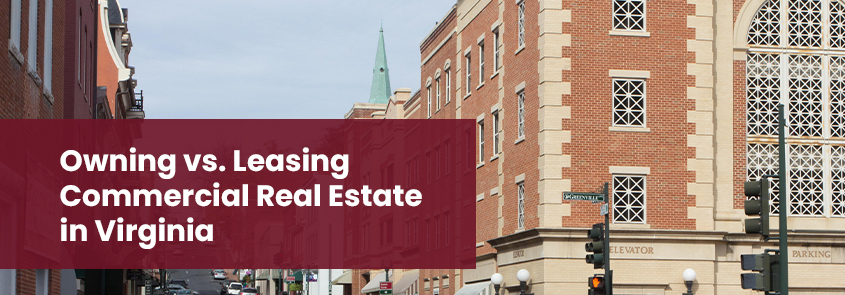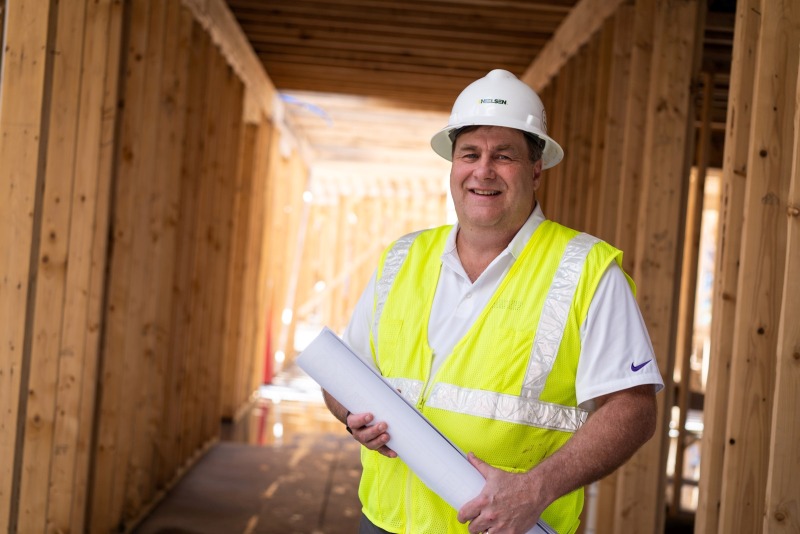Owning vs. Leasing Commercial Real Estate in Virginia
After finding the right property for your business, how do you decide whether to buy or lease it? There are pros and cons with both options, including the opportunity to build equity and profit off the future resale of your commercial real estate property. Keep reading for a complete guide to owning vs. leasing commercial real estate so you can make the best decision for your business. As always, our business banking team is here to help if you have questions!
Pros and Cons of Renting Commercial Real Estate

Let’s start with the benefits of renting a space for your business:
- No down payment, just need a security deposit and first month’s rent
- Usually cheaper on a month-to-month basis, including fewer expenses for upkeep
- Flexibility to move after lease is up if you outgrow the space or want to be in a newer building
- Get the most desirable location possible, even if it’s not for sale
- Easier accounting since your rented space is just a monthly expense, not an asset or liability
On the other hand, you need to consider these potential drawbacks:
- You won’t build equity or benefit from capital appreciation if the property value rises
- Rent is a monthly expense forever, whereas a commercial mortgage can eventually be paid off
- You may be responsible for certain upkeep expenses on some leases
- Rent may increase annually or with each new lease
- No opportunity to earn passive income by renting out part of your space to others
Buying Commercial Real Estate: Pros and Cons

Thinking that buying might be the way to go? Here are the benefits you stand to reap:
- Equity increases over time and the asset value appreciates
- Potential tax benefits and breaks for interest, depreciation, and other expenses
- More control over the property and design or renovation decisions
- Potential for renting out to other businesses
- Improvements to the building and property add value for your business as the owner
- Fixed mortgage payments as opposed to your rent potentially changing
On the other hand, owning may come with more expenses and responsibility:
- Need enough cash upfront for a down payment, closing costs, and other fees
- Can be hard to qualify for commercial real estate financing
- Have to budget for the ongoing costs of upkeep
- Less flexibility since you’re tied down to the location
- Liability
Tips for buying commercial property

If you’ve only purchased residential property before, you’ll want to work with an experienced commercial real estate agent and ask questions throughout the process. Commercial real estate is a different animal from buying a home to live in, but once you understand how it works and the different terminology, you’ll be an expert in no time.
- Some of the best commercial properties are not necessarily listed, which is why working with an experienced commercial real estate agent is so important.
- Talk to your real estate agent at the beginning to be sure you understand how the buying process works and what information you’ll need to provide along the way.
- When you’re ready to start the buying process, also talk to us about financing for your commercial real estate property. We can walk you through the steps and paperwork required to apply for a commercial real estate loan.
- As you look at different properties, consider zoning, closing costs, tax issues, and environmental conditions.
- If the building already has tenants, you’ll need to negotiate with the current owner/landlord over assignments of existing leases and delivery of current rents due. You’ll also want to obtain copies of the rent rolls and existing leases to make sure that neither the tenant nor seller is in default and that there is no past-due rent.
- Negotiating with commercial landlords can be challenging. They can look to keep some legal tricks hidden from you.
Contact us with all your CRE needs and questions!
Wherever your business is headed, F&M wants to help you get there. As a trusted community bank, we understand local business like no one else and believe that one business’s success contributes to the success of the entire business community. For more help with the buying process, F&M Bank is here to be your local commercial real estate expert in Virginia. Real estate is a local business, so when you’re looking for a commercial land loan or other type of commercial real estate loan in Augusta County, you want to work with a local bank who knows the market. Call us today to discuss your business goals and we’ll help you reach them with flexible financing options.




